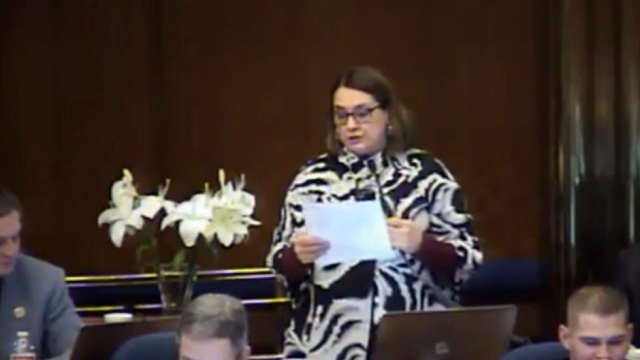Video: House Passes Drug Testing for Welfare Recipients With No Debate

It surprised me that there was no floor debate over HB1308 today.
Last week a pretty much identical bill failed in the state Senate on a 20-26 vote after a lengthy debate (video here). But in the state House today an amended version of HB1308 – which would refer those on employment plans in the TANF (welfare) system to drug treatment programs if they’re identified as “at-risk for an addiction” – passed on a 77-12 vote with no floor debate.
Here’s video of bill carrier Rep. Karen Rohr (R-Mandan) explaining the amendments to the legislation and her committee’s “do pass” recommendation. One key point she made was that 14 other states already have a version of this policy in place:
[fcc_jw_player key=”x4PtsL2V”]
Typically when these sort of bills come up they’re treated as a mechanism for saving the taxpayers money by denying government benefits to addicts. But I’m not sure about the efficacy of that sort of policy. Drug testing is expensive, and the cost of detecting substance abuse among beneficiaries is probably always going to be more than whatever is saved by denying them benefits.
HB1308, introduced by Rep. Daniel Johnston of Kathryn, actually doesn’t mention denying benefits in the amended form which passed the House. This section is pretty much the entirety of the bill:
As written, this bill isn’t a path to denying people benefits. It’s a tool for detecting people on the TANF roles who might have a substance abuse problem and referring them to treatment.
Drug testing for welfare recipients has been a priority for conservatives for a long time, but I think they’ve been emphasizing the wrong priority. It’s not about saving money by denying benefits. It’s about making a social welfare program more effective.
If this policy can channel people who need addiction help into programs which will deliver that help, I can’t help but think that’s a win in anyone’s book no matter what your politics.
The only question is what additional costs this might put on our human services agencies. Because, again, drug testing isn’t cheap and our social programs (including addiction treatment) are already overrun. If we create this obligation, and do not sufficiently fund it, we’ve accomplished very little.





